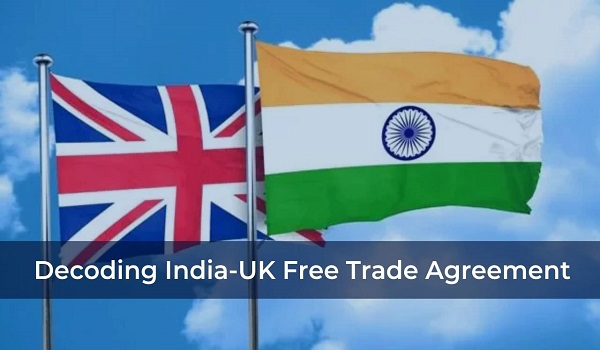The India-UK Free Trade Agreement (FTA) is set to enhance India’s export prospects in key sectors like tea, spices, marine products, and processed foods through significant tariff concessions. Meanwhile, domestic industries and farmers have welcomed the exclusion of sensitive items such as dairy products and rice from the agreement, protecting them from foreign competition.
Exporters expect improved access to the UK market, particularly for traditional Indian products that have long faced tariff barriers. At the same time, the decision to keep dairy and rice out of the deal has eased concerns among small-scale farmers and domestic processors.
Trade officials confirmed that the UK had proposed reducing the import duty on white (processed) rice, currently set at £121 per tonne—equivalent to 12–13% of the product’s landed value. However, that proposal was not included in the final agreement, addressing long-standing apprehensions from UK-based rice processors. Semi-processed (brown) rice from India will continue to be exported to the UK duty-free.
India annually exports around 160,000 tonnes of rice to the UK, mostly in semi-processed form. According to industry players, this model supports local UK processing while maintaining export volumes from India.
Dairy, another politically sensitive sector, also remains excluded from tariff concessions. Despite India being the world’s largest milk producer, the government has historically kept dairy products out of FTAs due to concerns over the livelihoods of its 100 million dairy farmers. The agreement maintains this stance, with no duty relaxation for imported cheese, apples, or other sensitive products.
The Indian Dairy Association reiterated that the sector must be shielded from trade liberalization. Industry leaders emphasized the importance of dairy not just as an economic contributor but as a critical livelihood source for millions of rural families.
On the import side, Indian markets are expected to see greater inflows of UK products such as Scotch whisky, lamb, confectionery, and salmon. Notably, UK lamb exports—previously subject to a 33% import duty—will now enter India tariff-free, boosting their appeal in the premium meat market.
The UK’s Trade and Agriculture Commission will independently review the agreement to ensure that the deal complies with UK standards on food safety, animal welfare, and environmental protection.
Overall, the FTA is viewed as a strategic win for Indian exporters in non-sensitive sectors, while safeguarding the interests of vulnerable domestic industries.


